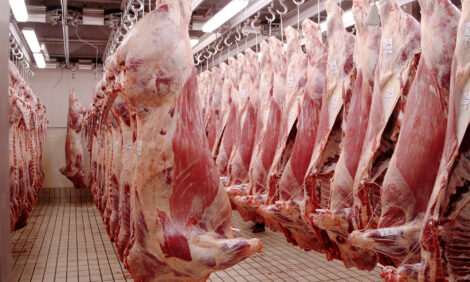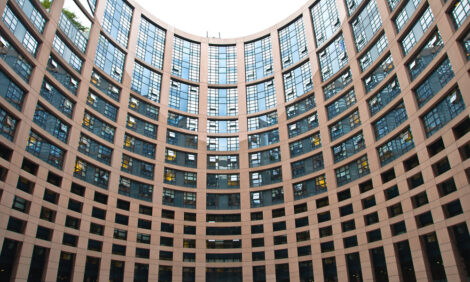



NCBA Members Elect Officers and Debate Policy Issues
NEVADA, US – Members of the National Cattlemen’s Beef Association (NCBA) held their board of directors meeting and annual membership meeting today, as the Cattle Industry Annual Convention concluded in Reno.Cattlemen debated a number of important policy issues, but enhancement of the Beef Checkoff Program drew the most interest and discussion. The $1 per head checkoff – split 50-50 between the national checkoff program and the state beef councils – became mandatory in 1986. While the checkoff has enjoyed many successes, some cattlemen are questioning whether it is still adequately funded.
“Twenty plus years of inflation have really eroded the beef checkoff’s ability to fulfill all the expectations we have placed on it over the years,” said NCBA President John Queen, a cattleman from Waynesville, N.C. “And increases in beef production have come primarily from higher cattle weights, rather than herd expansion. That’s another reason revenues don’t keep up with the industry’s needs. We’re producing more beef, but the revenue we need to market it doesn’t keep pace.”
While NCBA is one of several contractors that manages checkoff-funded programs, it doesn’t collect the checkoff or determine the assessment rate. Collection and expenditure of the checkoff rest with the Cattlemen’s Beef Board at the national level, while state beef councils manage the state portion. Any increase in the $1 per head rate would require action by Congress to amend the Beef Promotion and Research Act.
Cattlemen directed NCBA to ask Congress to approve a process that will allow producers to vote on enhancements to their Beef Checkoff Program.
“All we’re asking Congress to do is empower cattle producers with a referendum process, so they can control the destiny of their checkoff,” said incoming NCBA Policy Division Chairman Bill Donald, a rancher from Melville, Mont. “Producers will decide whether to increase the checkoff assessment, but this will put the procedure in place that allows them to do that.”
NCBA members declined to ask for a specific increase in the checkoff rate, but did request that Congress ensure that the program is adequately funded.
“The sense of the cattlemen at this convention is that $2 per head (a $1 increase) would adequately fund the program at this point in time,” said Donald. “But that can change over time, which is why we didn’t include a specific rate in today’s resolution.”
Other proposed changes to the Beef Checkoff Program supported by NCBA include:
- Simplifying the petition process that determines whether a referendum will be held on continuation of the checkoff. A valid petition signed by ten percent of the nation’s cattle producers would trigger USDA to hold a referendum within one year.
- Establish a similar petition/referendum process for future increases in the checkoff assessment. This would allow cattlemen to approve or disapprove a proposed increase, without taking the question back to Congress.
- Eliminate any reference to their charter date in determining whether organizations are eligible to manage checkoff-funded programs. Currently, some livestock organizations are not eligible because they were formed after 1986.
NCBA members also discussed whether the checkoff should be used to specifically promote U.S. born and raised beef. Currently, U.S. beef is specifically promoted only in foreign markets, while domestic programs promote all beef. This is due in part to the fact that assessments on imported cattle and beef account for about 11 percent (roughly $8 million per year) of Beef Checkoff Program revenues. Members directed that by June 1, NCBA report back to members of its Agriculture Policy Committee with amendment options to address this issue. But the resolution specifies that options maintaining the assessment on imported cattle and beef should be strongly considered.
For the most part, NCBA members maintained their policy on other major agricultural issues. With regard to renewable fuels, NCBA continues to favor a sunset of the 54-cent tariff on imported ethanol and the 51-cent-per gallon fuel blending tax credit. These programs are set expire in 2009 and 2010, respectively. NCBA members adopted a policy last year requesting that Congress not extend these subsidies beyond their current time frame.
NCBA still supports a voluntary, market-based approach to animal identification. But member policy was updated to recognize the legitimate benefits premises registration numbers can provide in meeting animal health emergency requirements - as long as they do not impede normal cattle movement.
In response to a number of recent food safety incidents, members reaffirmed their existing policy calling for NCBA to work with all segments of the beef industry, as well as government officials, to reduce the prevalence of E. coli O157:H7. This policy also calls for NCBA to seek the regulatory approvals necessary to implement sound safety practices across the industry.
Cattlemen also adopted policy expressing support for several educational and financial aid programs that will help address the nation’s growing shortage of large animal veterinarians.
All policies adopted are now subject to approval by more than 30,000 NCBA members nationwide. Convention results become official only after this mail-in ballot process concludes in March.
Andy Groseta, a rancher from Cottonwood, Ariz., was elected to succeed Queen as NCBA president for the coming year. Groseta says he wants to continue to grow and strengthen NCBA, especially by creating more opportunities for young people to succeed in the cattle industry.
“There is little doubt that we will retire at faster rate than new cattlemen will enter the industry,” said Groseta in his acceptance remarks. “We can’t stop this trend, but we can certainly make every effort to reduce it. This is absolutely essential, if we are going to keep our industry strong and ensure that the next generation of cattlemen has the representation it needs to be successful.”
He added that NCBA must build strong alliances with other agricultural organizations, so that livestock producers can effectively counter vocal critics who want to bring an end to animal agriculture.
“With fewer and fewer Americans having any direct connection to agriculture, these are tactics we must take seriously,” he said. “If we don’t let the public know about our commitment to the environment, to our communities, and to the economic vitality of rural America, others will paint a picture of the livestock industry that is ugly and distorted.”
Gary Voogt of Marne, Mich., was elected NCBA president-elect. Voogt served during the past year as chairman of the Federation of State Beef Councils Division of NCBA.
Astoria, Ill., cattleman Steve Foglesong was elected NCBA vice president. Foglesong served last year as NCBA Policy Division chairman and NCBA Membership Committee chairman. Donald now succeeds Foglesong in these leadership positions, while Lytton, Iowa, cattleman Alan Albright will succeed Voogt as Federation Division chairman.
TheCattleSite News Desk


